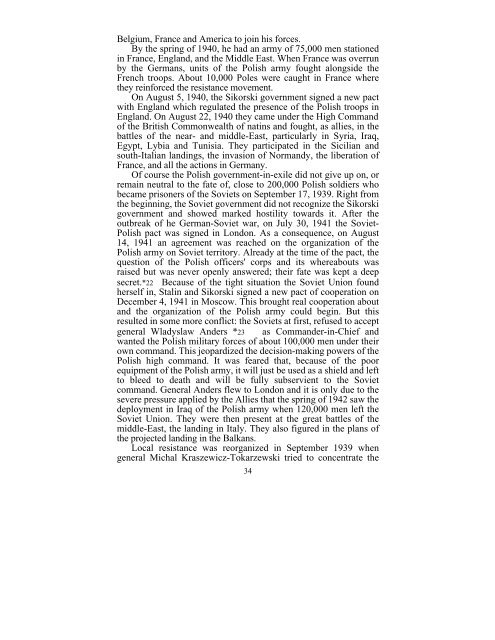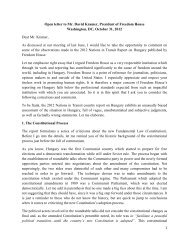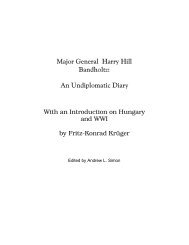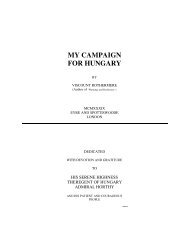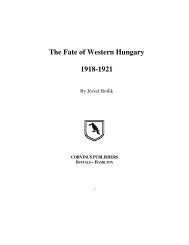the text - Corvinus Library - Hungarian History
the text - Corvinus Library - Hungarian History
the text - Corvinus Library - Hungarian History
Create successful ePaper yourself
Turn your PDF publications into a flip-book with our unique Google optimized e-Paper software.
Belgium, France and America to join his forces.<br />
By <strong>the</strong> spring of 1940, he had an army of 75,000 men stationed<br />
in France, England, and <strong>the</strong> Middle East. When France was overrun<br />
by <strong>the</strong> Germans, units of <strong>the</strong> Polish army fought alongside <strong>the</strong><br />
French troops. About 10,000 Poles were caught in France where<br />
<strong>the</strong>y reinforced <strong>the</strong> resistance movement.<br />
On August 5, 1940, <strong>the</strong> Sikorski government signed a new pact<br />
with England which regulated <strong>the</strong> presence of <strong>the</strong> Polish troops in<br />
England. On August 22, 1940 <strong>the</strong>y came under <strong>the</strong> High Command<br />
of <strong>the</strong> British Commonwealth of natins and fought, as allies, in <strong>the</strong><br />
battles of <strong>the</strong> near- and middle-East, particularly in Syria, Iraq,<br />
Egypt, Lybia and Tunisia. They participated in <strong>the</strong> Sicilian and<br />
south-Italian landings, <strong>the</strong> invasion of Normandy, <strong>the</strong> liberation of<br />
France, and all <strong>the</strong> actions in Germany.<br />
Of course <strong>the</strong> Polish government-in-exile did not give up on, or<br />
remain neutral to <strong>the</strong> fate of, close to 200,000 Polish soldiers who<br />
became prisoners of <strong>the</strong> Soviets on September 17, 1939. Right from<br />
<strong>the</strong> beginning, <strong>the</strong> Soviet government did not recognize <strong>the</strong> Sikorski<br />
government and showed marked hostility towards it. After <strong>the</strong><br />
outbreak of he German-Soviet war, on July 30, 1941 <strong>the</strong> Soviet-<br />
Polish pact was signed in London. As a consequence, on August<br />
14, 1941 an agreement was reached on <strong>the</strong> organization of <strong>the</strong><br />
Polish army on Soviet territory. Already at <strong>the</strong> time of <strong>the</strong> pact, <strong>the</strong><br />
question of <strong>the</strong> Polish officers' corps and its whereabouts was<br />
raised but was never openly answered; <strong>the</strong>ir fate was kept a deep<br />
secret.*22 Because of <strong>the</strong> tight situation <strong>the</strong> Soviet Union found<br />
herself in, Stalin and Sikorski signed a new pact of cooperation on<br />
December 4, 1941 in Moscow. This brought real cooperation about<br />
and <strong>the</strong> organization of <strong>the</strong> Polish army could begin. But this<br />
resulted in some more conflict: <strong>the</strong> Soviets at first, refused to accept<br />
general Wladyslaw Anders *23 as Commander-in-Chief and<br />
wanted <strong>the</strong> Polish military forces of about 100,000 men under <strong>the</strong>ir<br />
own command. This jeopardized <strong>the</strong> decision-making powers of <strong>the</strong><br />
Polish high command. It was feared that, because of <strong>the</strong> poor<br />
equipment of <strong>the</strong> Polish army, it will just be used as a shield and left<br />
to bleed to death and will be fully subservient to <strong>the</strong> Soviet<br />
command. General Anders flew to London and it is only due to <strong>the</strong><br />
severe pressure applied by <strong>the</strong> Allies that <strong>the</strong> spring of 1942 saw <strong>the</strong><br />
deployment in Iraq of <strong>the</strong> Polish army when 120,000 men left <strong>the</strong><br />
Soviet Union. They were <strong>the</strong>n present at <strong>the</strong> great battles of <strong>the</strong><br />
middle-East, <strong>the</strong> landing in Italy. They also figured in <strong>the</strong> plans of<br />
<strong>the</strong> projected landing in <strong>the</strong> Balkans.<br />
Local resistance was reorganized in September 1939 when<br />
general Michal Kraszewicz-Tokarzewski tried to concentrate <strong>the</strong><br />
34


